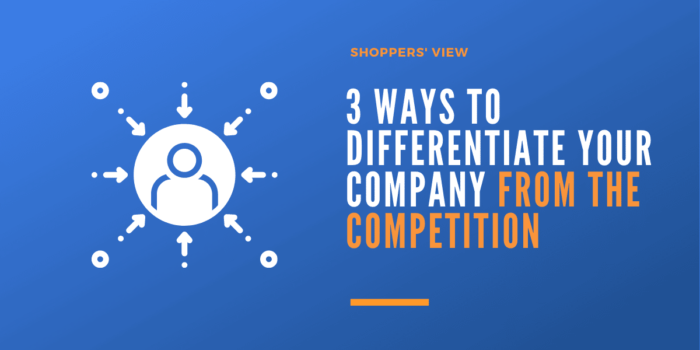According to Investopedia, product differentiation is “a marketing strategy designed to distinguish a company’s products or services from the competition.”
Sounds simple, right? Just find what makes your product or service different, focus your strategy on that and customers will come to you! Well, it’s not always that easy. Someone out there has a product or service that’s the same as yours—and they might even be next door.
The things you think differentiate your brand or service from others on the market might not actually be what customers care about most.
3 Things that Aren’t Good Differentiators
1. Price
When a business experiences lower foot traffic, they may lower their prices to bring people into the store. However, the prices are not the only thing a customer looks at when making a purchase.
Customers have a choice where to spend their money. Should they spend it with whichever business has the lowest prices?
Those that hunt for the lowest prices and consider the product or service’s price to be a huge factor in their decision are price sensitive. Some may feel a low price is too good to be true and will choose more expensive items when making that purchase. Other customers look for the lowest price possible, even if it means they end up with an inferior product or service.
Customers may shop on price if it’s the only thing separating them from the competition. But what other factors do customers weigh?
Customers who are emotionally connected to your business or brand will be your most profitable customers. They are loyal, care less about price and will go out of their way to shop at your establishment.
Having good sales people that fully understand your products and services can help drive customer engagement. Customers won’t care as much about price if your service is impeccable.
2. Product/Service
It’s highly unlikely your product or service will be that different from a similar one offered up the
street or on the website over (no offense!). Yes, your pizza may be delicious, which alone may bring in plenty of customers—but your neighborhood competing pizza restaurant also has its own batch of loyal customers returning because they love the flavor of that pizza more than yours. The essence of your product is the same.
Even if you have plenty of patents surrounding your product or service, these won’t be fool proof. Someone, somewhere will find a loophole and begin making a product effectively the same as yours.
If all you have to lean on is how great your product is, that really isn’t enough to differentiate yourself from your competition. If your product is just a product and your service is just a service—and it doesn’t invoke brand loyalty for any particular reason beyond its usefulness—you won’t be different from someone else providing a similar thing.
3. Branding
Yes, branding is incredibly important, and it may bring in customers who love you for your look. But it’s incredibly difficult to make your branding stand out in a sea of similar options. Trends contribute to brands often looking similar even if they provide widely different services.
A strong brand helps customers remember you, recognize you and enjoy working with you—but catchy taglines, colors and fonts are only a piece to the bigger puzzle of differentiation. The way you look and talk about yourself (and that general “vibe”) doesn’t change what your product or service is.
Ultimately, if your branding is strong, you may win some customers over, but it won’t necessarily be enough to keep customers around and loyal if your product doesn’t give them what they want. When trends change and a new company with a fresher brand comes along, your customers may switch over to them without batting an eye.
If your brand just blends in with the many others trying to do the same thing in different ways, that’s not differentiation, it’s simply surface-level difference.
So, what can you do to actually differentiate your company from your competition?
3 Ways to Differentiate Your Company from the Competition
What can you do to stand out from the competition so that you’re not competing solely on price, product and brand?
1. Employ Better Sales Staff than Your Competition
To achieve this, you could implement regular training for sales reps to stay on top of changes in products and services. You can also create an environment that makes your employees feel like an asset to the organization, not just overhead. When staff feel encouraged and part of a team, they know they are valued and are willing to work hard toward the success of the company.
While customers may sometimes shop based on price or other pseudo-differentiators, high-quality customer service creates true loyalty.
Another aspect of this is training your staff to anticipate objections. By ensuring staff have an in-depth knowledge of your products and services, as well as those of your competitors, staff will be able to answer questions quickly and accurately so that your customers can make the best-informed decision.
2. Position Yourself Better in the Marketplace
What can your business do to better position itself in the marketplace, so customers perceive that your product or service is the clear choice compared to the competition?
Think about what makes your company unique and what strengths you have compared to your competitors. What can you do differently or change to set your business apart? For example, this could be how quick you pivot and respond to changing trends or customer requests, or how you sell your product in a unique way (e.g. cutting out the middleman when your competition hasn’t yet).
3. Tell a Better Story
Your story (which includes your process and values) is a great way to set yourself apart from your competition. A competitor may have a similar product, price-point and brand design as you, but they won’t have the same story—especially if you angle this in the right way.
Hone in on what your company’s values are—and then live them. This could mean volunteering (and sharing about it), telling the personal story of how your company or service began (and showing the faces of those who started it) and communicating your process (unique or not) in a unique or engaging way on various platforms. These elements come together to tell a bigger story that customers are interested in—and as a result, may become loyal advocates of, even as trends and times change.
Consider Using Voice of Customer (VOC) Data
What if you knew exactly what your customers want and need? Voice of Customer (VOC) Data is a marketing research technique that captures what your customers expect, what their preferences are and what they don’t like. Data is gathered based on the customer’s experiences with your products and alternative products that they may consider from your competitors.
Do your competitors have higher quality products and services? Do they have better customer service? VOC data can provide you with practical ideas on how to best stand out from the competition.
How do you differentiate from the competition? Do you want to learn what your competitors are doing that you could be doing better? What if you could visit or call your competitors to see how your business compares? Learn how Shoppers’ View can help!

